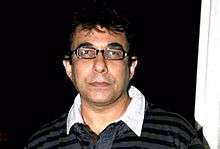
Oops! (film)
Oops! is a 2003 Hindi drama film directed and produced by Deepak Tijori. It was his directorial debut. Based on the topic of male strippers, the film faced protests before screening. The film was produced on a budget of ₹25 million (US$370,000). It was considered controversial because of the subject matter and initially it faced troubles with the Central Board of Film Certification. The film was released in two versions – Hindi and English. It did not receive favourable reviews but proved to be a turning point in actress Mink Brar's career. When the film flopped at the box office Tijori said that he had "alienated the audience with too much sex in the promos".
Plot
Jahaan (Kiran Janjani), Aakash (Vikas Sethi) and Jahaan's girlfriend Nikki (Adyasha) are good friends and members of a dance troupe. Jahaan wants to get rich very quickly while Aakash wants to establish his career as a dancer. Impressed by Jahaan's dancing skills, Sonia (Mink Brar) tells him that he could earn a large sum of money by stripping at shows. The other also joins him on the condition that he will do it only once. The second friend refuses to do another show and both the friends quarrel over this matter. Jahaan continues to perform at strip shows. At one of these shows he meets a middle-aged woman, Sharon (Mita Vashisht), and falls in love with her. When Sharon gets bored of this affair, she breaks it off but Jahaan is unable to recover. He does not behave properly with Nikki and eventually she leaves him. One day, Aakash's father Mr. Rai invites Jahaan to his home for dinner. At his house Jahaan learns that Sharon is actually Mrs. Rai, Aakash's mother.
Film (band)
Film was a Yugoslav rock group founded in 1978 in Zagreb. Film was one of the most popular rock groups of the former Yugoslav new wave in the late 1970s to early 1980s.
History
New wave years (1979-1981)
During 1977 and 1978, bassist Marino Pelajić, guitarist Mladen Jurčić, and drummer Branko Hromatko were Azra members when Branimir "Johnny" Štulić brought Jura Stublić as the new vocalist. Stublić was to become Aerodrom member, but due to his deep vocals it never happened. The lineup functioned for a few months only and after a quarrel with Štulić, on early 1979, Pelajić, Jurčić, Hromatko and Stublić formed the band Šporko Šalaporko i Negove Žaluzine, naming the band after a story from the "Polet" youth magazine, which was soon after renamed to Film. The memories of the Azra lineup later inspired Štulić to write the song "Roll over Jura" released on Filigranski pločnici in 1982.
Saxophonist Jurij Novoselić, who at the time had worked under the pseudonym Kuzma Videosex, joined the band, inspiring others to use pseudonym instead of their original names: vocalist Stublić became Jura Jupiter, bassist Pelajić became Mario Baraccuda and guitarist Jurčić became Max Wilson. Before joining the band, Stublić did not have much experience as a vocalist, however, since his father had been an opera singer, he often visited the theatre and opera, and at the age of 13, he started playing the guitar, earning money as a street performer at seaside resorts.
Film (Iranian magazine)
Film (Persian:فیلم) is an Iranian film review magazine published for more than 30 years. The head-editor is Massoud Mehrabi.
References
External links

Film (film)
Film is a 1965 film written by Samuel Beckett, his only screenplay. It was commissioned by Barney Rosset of Grove Press. Writing began on 5 April 1963 with a first draft completed within four days. A second draft was produced by 22 May and a forty-leaf shooting script followed thereafter. It was filmed in New York in July 1964.
Beckett’s original choice for the lead – referred to only as “O” – was Charlie Chaplin, but his script never reached him. Both Beckett and the director Alan Schneider were interested in Zero Mostel and Jack MacGowran. However, the former was unavailable and the latter, who accepted at first, became unavailable due to his role in a "Hollywood epic." Beckett then suggested Buster Keaton. Schneider promptly flew to Los Angeles and persuaded Keaton to accept the role along with "a handsome fee for less than three weeks' work."James Karen, who was to have a small part in the film, also encouraged Schneider to contact Keaton.
The filmed version differs from Beckett's original script but with his approval since he was on set all the time, this being his only visit to the United States. The script printed in Collected Shorter Plays of Samuel Beckett (Faber and Faber, 1984) states:
Podcasts:

